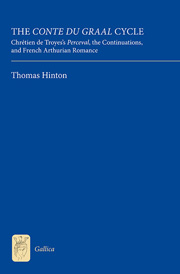 The Conte du Graal Cycle
The Conte du Graal Cycle Book contents
- Frontmatter
- Contents
- List of illustrations
- Acknowledgments
- List of Abbreviations
- Manuscript Sigla
- Introduction
- 1 Narrative Aesthetic and Cyclic Formation
- 2 Manuscripts, Memory and Textual Transmission
- 3 Authorship, Kinship and the Ethics of Continuation
- 4 Rereading the Evolution of Arthurian Verse Romance
- Conclusion
- Appendix 1 Narrative Summaries
- Appendix 2 Lengths and Dates of Texts
- Appendix 3 Manuscripts of the Conte du Graal Cycle
- Appendix 4 Full Contents of Conte du Graal Cycle manuscripts
- Appendix 5 Arthurian Verse Romances: Dates and Manuscripts
- Appendix 6 Contents of Arthurian Verse Romance Manuscripts
- Bibliography
- General Index
- Index of Manuscripts
- Miscellaneous Endmatter
Conclusion
Published online by Cambridge University Press: 05 September 2013
- Frontmatter
- Contents
- List of illustrations
- Acknowledgments
- List of Abbreviations
- Manuscript Sigla
- Introduction
- 1 Narrative Aesthetic and Cyclic Formation
- 2 Manuscripts, Memory and Textual Transmission
- 3 Authorship, Kinship and the Ethics of Continuation
- 4 Rereading the Evolution of Arthurian Verse Romance
- Conclusion
- Appendix 1 Narrative Summaries
- Appendix 2 Lengths and Dates of Texts
- Appendix 3 Manuscripts of the Conte du Graal Cycle
- Appendix 4 Full Contents of Conte du Graal Cycle manuscripts
- Appendix 5 Arthurian Verse Romances: Dates and Manuscripts
- Appendix 6 Contents of Arthurian Verse Romance Manuscripts
- Bibliography
- General Index
- Index of Manuscripts
- Miscellaneous Endmatter
Summary
I have seen no book of chivalry that creates a complete tale, a body with all its members intact, so that the middle corresponds to the beginning, and the end to the beginning and the middle; instead they are composed with so many members that the intention seems to be to shape a chimera or a monster rather than to create a well-proportioned body.
Cervantes' canon gave his summary judgment on chivalric romance over four hundred years ago, but the distaste shown for the narrative structure of such texts is strikingly similar to the reservations expressed by many modern readers of thirteenth-century Arthurian literature. Indeed, it was not until the second half of the twentieth century that scholars began to develop a taste for, and an appreciation of the lengthy and often repetitive adventures of Arthurian narratives. Norris Lacy offers the case of John Steinbeck's protracted attempts to modernise Malory as an example of the aesthetic challenges that medieval romance can pose today. Beginning his project with the conviction that most modern readers (and scholars) had failed properly to appreciate Malory. Steinbeck soon found himself making substantial changes to his source material: out went the repetitions, the temporal dislocations and the interlace. Becoming progressively dissatisfied with both the aesthetic and the ethos of Malory's Arthurian world. Steinbeck eventually ended his book at the point when Lancelot and Guinevere kiss, leaving the rest of his source text unnarrated. If the taste for Arthuriana is as strong today as it has ever been, the medieval romances on which contemporary versions depend remain stubbornly resistant to the aesthetic norms of modern literature.
- Type
- Chapter
- Information
- The Conte du Graal CycleChrétien de Troyes's Perceval, the Continuations, and French Arthurian Romance, pp. 218 - 228Publisher: Boydell & BrewerPrint publication year: 2012


